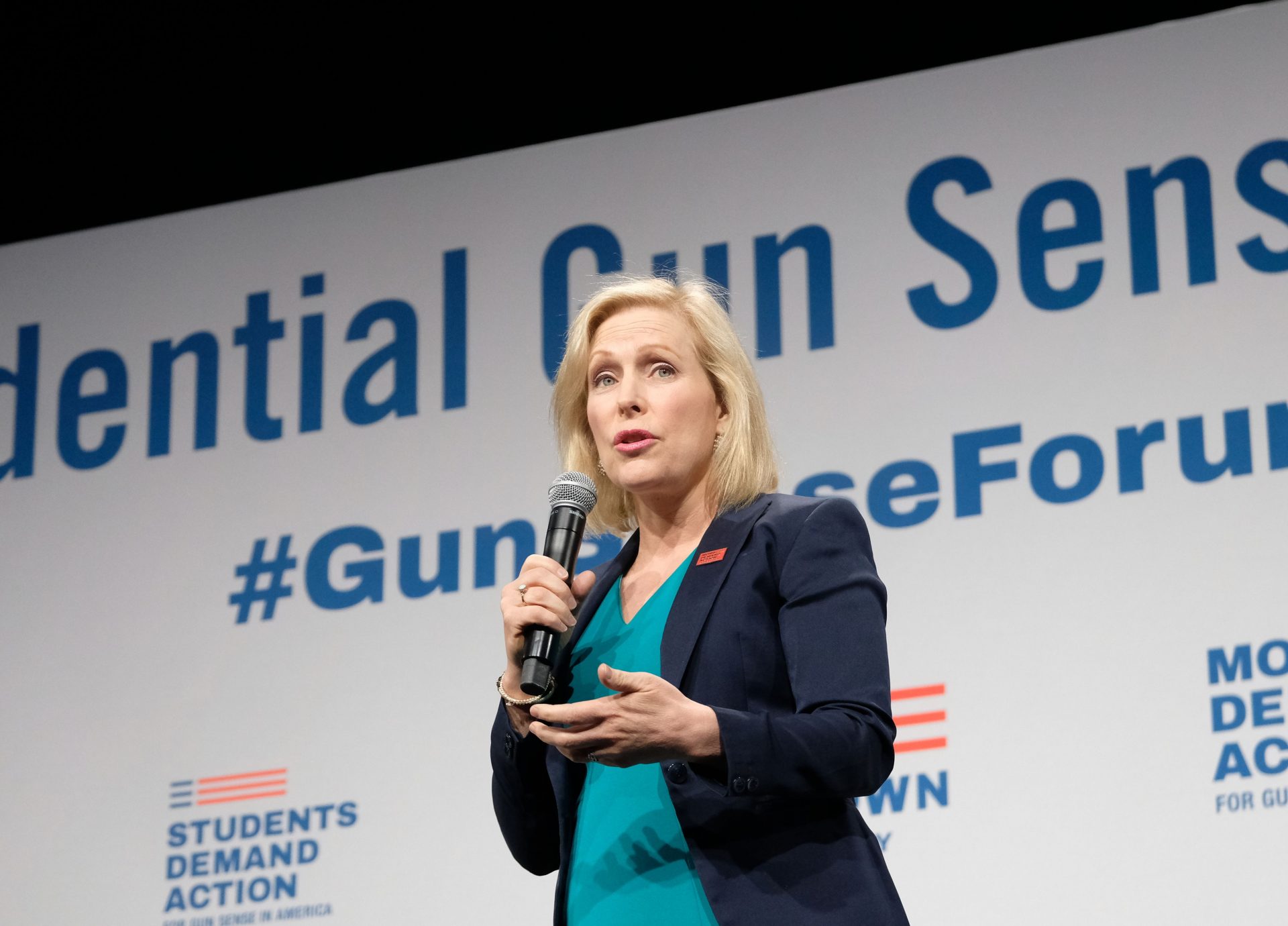Democratic presidential contenders rolled out new gun control plans in the wake of two mass shootings earlier this month in El Paso, Texas, and Dayton, Ohio.
But one contender, Sen. Kirsten Gillibrand, has diagnosed the problem as part of an “industrial-strength influence campaign” from conservative advocacy groups on the Republican-appointed justices of the Supreme Court — and is making the argument to the judges themselves.
The New York lawmaker this week signed on to a friend-of-the-court brief in a high-profile Second Amendment case over now-defunct New York City laws and regulations, urging the justices to drop the matter. The brief was also signed by Sens. Sheldon Whitehouse, D-R.I., Mazie Hirono, D-Hawaii, Richard Blumenthal, D-Conn., and Dick Durbin, the Democratic whip, of Illinois.
The brief slams lobbying efforts by the National Rifle Association and the Federalist Society, an influential legal group with ties to the Trump administration and all of the court’s Republican-appointed justices. And it says that the court should not participate in what it calls a conservative “project.”
The argument comes as other presidential contenders, including South Bend, Indiana, Mayor Pete Buttigieg, have criticized the increased politicization of the Supreme Court. But unlike arguments made by other candidates, the critique quietly put forward by Gillibrand was delivered directly to the justices.
The brief itself apparently alludes to the court-reform proposals, warning that the court is “not well,” and wondering whether it can “heal itself before the public demands it be ‘restructured in order to reduce the influence of politics,'” citing language from a recent Quinnipiac University poll, which found a majority of voters supported court restructuring.
Democratic proposals to reform the court have included expanding the size of the panel as well as shifting the way the judges are selected.
Besides Buttigieg and Gillibrand, candidates Sens. Kamala Harris and Elizabeth Warren and former Texas Rep. Beto O’Rourke have signaled an openness to adding justices to the court. Former Vice President Joe Biden and Sen. Bernie Sanders, the race’s two leaders, have said they oppose such an expansion, however. Sanders, though, has floated support for term limits or instituting a system in which justices are rotated to appeals courts.
Court reform efforts gained new traction following the contentious confirmation hearings of Justice Brett Kavanaugh last year, which prompted liberal activists to urge Democratic lawmakers to address the court’s newly reliable conservative majority.
The senators’ brief spends considerable time on Kavanaugh’s confirmation.
The NRA “promoted the confirmation (and perhaps selection) of nominees to the court who, it believed, would ‘break the tie in Second Amendment cases,'” the brief says, citing an NRA television ad from last fall that said, “President Trump chose Brett Kavanaugh to break the tie.”
“Out in the real world, Americans are murdered each day with firearms in classrooms or movie theaters or churches or city streets, and a generation of preschoolers is being trained in active-shooter fire drills,” the brief says. “In the cloistered confines of this Court, and notwithstanding the public imperatives of these massacres, the NRA and its allies brashly presume, in word and deed, that they have a friendly audience for their ‘project.'”
Neither the NRA nor the Federalist Society responded to a request for comment. Whitehouse, who took the lead on the filing, said in a statement that the “brief lays out what is increasingly clear to many Americans: a majority of the Supreme Court is acting as if it has been captured by special interests. The Court is encircled by anonymously funded organizations seeking partisan political gain, not adherence to law.”
Another friend-of-the-court brief, limited to the case’s legal issues, was signed by 139 members of the House of Representatives, including Reps. Seth Moulton and Tim Ryan, who are also running for the Democratic nomination.
Gillibrand, who has gone after the NRA throughout her presidential campaign, has come under scrutiny for her past views that were sympathetic to the gun lobby. In 2008, while representing upstate New York in Congress, Gillibrand signed onto a friend-of-the-court brief urging the justices to overturn a Washington handgun ban, which the court ultimately did.
The NRA has made public a 2008 letter from Gillibrand to the NRA’s then-executive director which she expresses her support for “the work that the NRA does to protect gun owners rights.”
Gillibrand has said she regrets her past positions. She told CBS last year that it was “something that I’m embarrassed about and I’m ashamed of.”
The legal dispute, which is expected to be argued in the winter or spring, is looming over conversations about new regulations on firearms and ammunition. It has been nearly a decade since the top court last heard a major Second Amendment case.
The case was brought by the New York State Rifle & Pistol Association and challenged New York City rules that barred transporting firearms to gun ranges outside the city limits. New York won the legal fight before two lower courts, including a panel of the 2nd U.S. Circuit Court of Appeals.
But after the Supreme Court agreed to review the Second Circuit decision, New York amended the challenged rules in order to give the challengers “everything they want, ” according to New York’s corporation counsel, Zachary Carter. Because New York voluntarily amended the disputed laws and regulations, the case should no longer be reviewed by the justices, New York argues.
The rifle association is asking the court to move forward with arguments in the case because of the significant Second Amendment issue at play, even if New York’s rules no longer apply. Paul Clement, who is representing the group, wrote in a brief that New York “has not even tried to hide the fact that its paramount goal is to evade the prospect of a binding unfavorable decision.”
The lawmakers’ brief cites previous arguments from Chief Justice John Roberts, a George W. Bush appointee. Roberts, a conservative, is known to be protective of the court’s public image. The brief quotes from Roberts’ dissent in the 2015 landmark gay rights case Obergefell v. Hodges, which upheld the right of gay couples to marry, in which Roberts declared that the court “is not a legislature.”
The brief notes that the Republican-appointed justices have formed the majority in 78 cases between 2005 and 2018, 73 of which “concerned interests important to the big funders, corporate influencers, and political base of the Republican Party.”
“Obviously, the Court is not standing back in dispassionate form and ‘calling balls and strikes’ when it is laying the groundwork for future policy changes or soliciting opportunities to change policy,” the brief says, citing the baseball metaphor Roberts famously employed during his own Senate confirmation hearings. “That should be unacceptable in the context of separated powers.”
The justices are set to decide on whether the case still merits review in October.
















